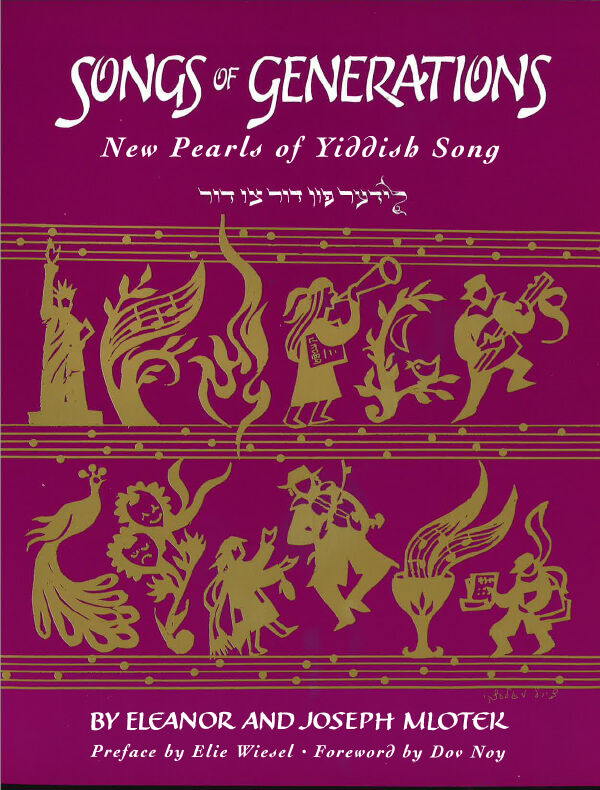Folklorized song of the underworld, published by S. Lehman in Warsaw (1928), who writes that the song arose during the German occupation in Poland during World War I. It also appeared in the VIVO Filologishe shriftn, V, 1938. According to the sheet music published in this country, the words are by Gus Goldstein, music by Max Leibowitz, published by S. Schenker Co., N.Y. in 1920. The song was submitted to the Perl by the following readers: Sam Adler, Studio City, Ca.; Godl Jacobson, Hallandale, Fla., Abraham Arbetman, LA., Hershl Altman, Bronx, NY., Jacob Schaefer, L.A., Kh. Tselemenski, Montreal, Victor Weitzman, North Miami Beach and Chaim Sheskin, Brooklyn, N.Y. It was sung by Lillian Klempner in the film Image Before My Eyes produced by Josh Waletzky.

Friday night
when I come walking from shul
my dear little wife is standing there and she laughs–
oh, she is full of charm!
And the little challahs are covered,
with a napkin that gleams.
Only a Jew knows the smell
of Friday night.
After kiddush, a piece of fish
that my wife prepared herself,
it’s worth a bit of a kiss –
on Friday night.
Oh, on Friday night
every Jew is a king.
In every corner it gleams,
the whole house is happy.
After the noodle soup
the bit of meat is also very good.
and I can feel how it tastes
because I am a Jew.
After the tsimmes, a little glass of wine –
the one who thought that up was no fool,
and I lay myself down in bed,
on Friday night.
Poor or rich–
everyone sings at the meal,
all are equal, then –
until Sunday morning.
Der yold iz mikh mekane,
Der yold iz mikh mekane,
Der yold iz mikh mekane
Mit mayn laykht shtikele broyt.
Er vii fun gornisht visn
Az di keshene iz tserisn,
Es kumt mir on shver vi der toyt.
Mayn mame un mayn tate
Zey zaynen gevezn blate,
A rebele ikh zol vern
Dos iz zey’r farlang.
Biz draytsn yor k’seyder
Hob ikh gelernt in kheyder
Biz draytsn yor hob ikh gekvetsht di bank.
In dem bin ikh gezesn,
Getrunken un gegesn,
Mayn mamenyu fleg mir untershtekn
A kleyn bisele broyt.
Geshtorbn iz der tate,
Un bald nokh dem di mame,
Geblibn bin ikh elnt oyf di velt.
A yerushe hob ikh bakumen
Mit andere mezumen,
Kortn-shpiln un koleges
Arayngelozt zikh shtark.
S’gelt hob ikh farlorn
In kortn ongevorn,
Geblibn bin ikh reyn on a mark.
Kum ikh arayn in mark
Un pak a gutn targ,
A masematn fun dolarn
Hot zikh mir gemakht.
Kukt oyf mir a yente
Un shikt on oyf mir a mente,
M’nemt mikh glaykh
Un m’tsintevet mir arayn.
In turme bin ikh gezesn
Un aroysgekukt durkh di kratn,
Zumer ze ikh regns gisn,
Vinter ze ikh shney.
Ale mayne yorn
Zenen in tfise opgeforn
Un haynt tut mir in yedn eyver vey.
דער יאָלד איז מיך מקנא,
דער יאָלד איז מיך מקנא,
דער יאָלד איז מיך מקנא
מיט מײַן לײַכט שטיקעלע ברױט;
ער װיל פֿון גאָרנישט װיסן,
אַז די קעשענע איז צעריסן,
עס קומט מיר אָן שװער װי דער טױט.
מײן מאַמע און מײַן טאַטע
זײ זענען געװעזן בלאַטע,
אַ רבילע איך זאָל װערן
דאָס איז זײיר פֿאַרלאַנג,
ביז דרײַצן יאר כּסדר
האָב איך געלערנט אין חדר
ביז דרײַצן יאָר האָב איך געקװעטשט די באַנק.
אין דעס בין איך געזעסן,
געטרונקען און געגעסן,
מײַן מאַמעניו פֿלעג מיר אונטערשטעקן
אַ קלײן ביסעלע ברױט.
געשטאָרבן איז דער טאַטע,
און באַלד נאָך דעם די מאַמע,
געבליבן בין איך עלנט אױף די װעלט,
אַ ירושה האָב איך באַקומען
מיט אַנדערע מזומן,
קאָרטן-שפּילן און קאָלעגעס
אַרײַנגעלאָזט זיך שטאַרק.
סיגעלט האָב איך פֿאַרלאָרן
אין קאָרטן אָנגעװאָרן,
געבליבן בין איך רײן אָן אַ מאַרק.
קום איך אַרײַן אין מאַרק
און פּאָק אַ גוטן טאַרג,
אַ משׂא-מתּן פֿון דאָלאָרן
האָט זיך מיר געמאַכט.
קוקט אױף מיר אַ יענטע
און שיקט אָן אױף מיר א מענטע,
מינעמט מיך גלײַך
און מע צינטעװעט מיר אַרײַן.
אין טורמע בין איך געזעסן
און אַרױסגעקוקט דורך די קראַטן,
זומער זע איך רעגנס גיסן,
װינטער זע איך שנײ.
אַלע מײַנע יאָרן
זײַנען אין תּפֿיסה אָפּגעפֿאָרן
און הײַנט טוט מיר אין יעדן אבֿר װײ.
Song Title: Der Yold Iz Mikh Mekane

The Songs of Generations: New Pearls of Yiddish Song anthology comprises songs that were either never printed before or appeared in rare and inaccessible publications — sometimes in different versions and without proper sources. Most of the songs in this book were submitted by readers of Chana and Yosl’s column “Perl fun der yidisher poezye” (Pearls of Yiddish Poetry) in the Yiddish newspaper Der Forverts (The Forward), initiated in October, 1970. Over 25 years, thousands of songs were collected in correspondence and on cassettes from readers throughout the world, and they represent a veritable national Yiddish song archive. Chana Mlotek, in her introduction, writes, “In the course of years the inquiries, contributions and enthusiasm of these readers have kept our own interest unflagging and have reinforced our dedication to this effort. And in recent years our participants have also been augmented by new readers from the former Soviet Russia, who receive our newspaper there or from newly-arrived immigrants in this country and Israel.”